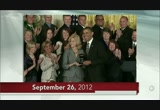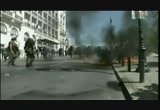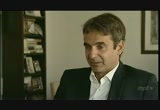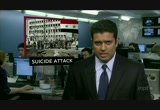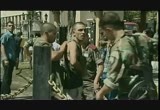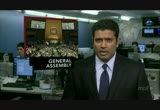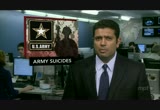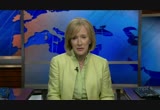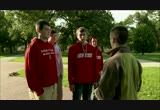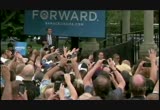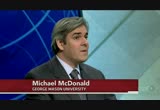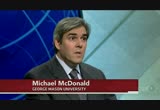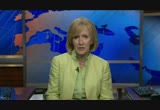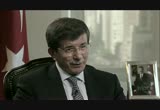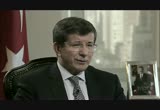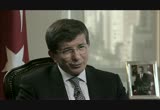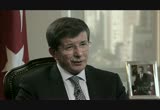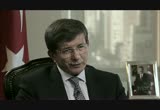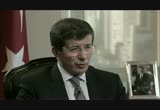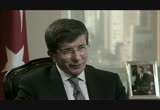tv PBS News Hour PBS September 26, 2012 6:00pm-7:00pm EDT
6:00 pm
captioning sponsored by macneil/lehrer productions >> ifill: thousands of protesters clashed with police in athens today as an anti-austerity strike turned violent. good evening, i'm gwen ifill. >> woodruff: and i'm judy woodruff. on the "newshour" tonight, we get the latest on the unrest boiling over in greece and also in spain as europe tries to come to grips with its debt crisis. >> ifill: then, two takes on politics: first, how the campaigns are targeting young voters. >> the largest segment of undecided voters in america i think will be found on college campuses. we're seeing more than 10% of 18- to 24-year-olds at this point in the campaign are still
6:01 pm
undecided. >> woodruff: and we look at the push to get voters to cast their ballots before election day. >> ifill: plus, turkey's foreign minister tells margaret warner the syrian war is spilling over the border into his country. >> we have around 90,000 refugees in our camps and around 40,000 refugees in several cities. it is a humanitarian treasure. >> woodruff: from our american graduate series, ray suarez gets the teacher of the year's take on how to engage students and keep them from dropping out. ♪ >> ifill: and we remember the singer who made americans swoon. andy williams. that's all ahead on tonight's "newshour." major funding for the pbs newshour has been provided by:
6:02 pm
and with the ongoing support of these institutions and foundations. and... this program was made possible by the corporation for public broadcasting. and by contributions to your pbs station from viewers like you. thank you. >> woodruff: the trouble in greece today and in spain overnight brought the plight of europe's debt-ridden countries squarely back into the spotlight. street battles erupted in athens as nearly 70,000 people staged the largest demonstration since may of last year. we have a report from james mates of "independent television
6:03 pm
news." >> reporter: it's a sight that has become all too familiar in central at thens. a day supposed to have been about a general strike and peaceful protest turned quickly into ugly violence. the police were prepared, but against volleys of pet troll bombs they could do little more than stand their ground and wait with tear gas and stun grenades to turn them back. this is the first protest since a new government was elected three months ago, a government forcing through yet another round of punishing spending cuts. in a country where one in four are already unemployed, perhaps one shouldn't be surprised the public anger at times tips over into violence. the morning had seen tens of thousands march on parliament demanding the government change course. they know it's hopeless, of course, their leaders are deep in negotiations with europe and the i.m.f. about cutting wages
6:04 pm
and pensions by anything up to 30%. and this in a city where already one in three businesses has closed. >> we have to do something for our future to have a regular job, to have a family. >> all of europe should have a voice against these policies. >> reporter: there will be little reassurance of promises of no more cuts after these. >> there is no scope for any further reductions in wages and pensions beyond this specific package. this is a commitment that the government has made. >> reporter: the greeks have been told that before. >> yes, they have been told that before. but should the government not meet that commitment, in my mind that would mean the end of this government. >> reporter: the protest was brief. it was all over within a couple of hours but there are many difficult votes ahead here in the greek parliament and no one expects that to have been the end of the trouble. >> ifill: the violence in athens came hours after police and
6:05 pm
demonstrators fought in the streets of madrid, spain. on tuesday evening, 6,000 people marched on the national parliament building, protesting new austerity measures. some threw rocks and bottles, and police fired rubber bullets. 38 people were arrested. the scenes of unrest roiled european markets, and major indexes there fell one to two percent today. for more on the economics and the politics at play in europe. i'm joined by jacob kirkegaard of the peterson institute of international economics. mr. kirkegaard, it seems to me that we have spent a great deal of time talking about this unrest in europe and there had been a lull. what happened? >> well, i think we need to keep in mind that the violence we saw today-- or the strikes at least in athens, were not spontaneous reactions of public outrage. there were sort of strategically planned demonstrations timed to coincide by the greek labor unions with the crunch time in the negotiations between the greek government and the i.m.f. so that without being too
6:06 pm
cynical, you could actually say that if the streets of athens were burning it would actually at the margin help the greek government in the negotiations with the i.m.f. and the troika, because it would show that the greek people really couldn't take much more austerity. so there is a strategic element in these protests. >> ifill: what about in spain? >> well, in spain it's a little bit of the same thing because tomorrow is the time when the spanish government announces its 2013 budget and at the same-- and a lot of this budget will also at least implicitly be dictated by the demand of the european union because there is a very strong likelihood that the greek-- sorry, spanish government in the short future will be approaching the european union authorities for a bailout. so what the spanish government is trying to do is sort of preemptively announce many of the reforms that they would otherwise be forced upon them. so, again, the protestors are
6:07 pm
trying to basically make a signal that we can't take any more at this very moment. >> ifill: trying to force someone's hand. it all sounds so strategic. it sounds like positioning. so it is-- what's driving it? is it money? is it politics? or is it emotion? >> well, i think it's a bit of both but it is first and foremost politics. because i think that what we are seeing here in the case of spain, for instance, we are-- we have a spanish government that is basically trying to minimize the political costs of approaching the european stability mechanism for a bailout that will give it access to support from the european central bank. now, if you look at the previous governments in the euro area that have approached the i.m.f. and the european authorities for a bailout, well, they've all been voted out of office at the next election. and what the spanish government is really trying to do is avoid that scenario by, as i said earlier, trying to preemptively announce many of the reforms that would otherwise be-- they would otherwise be forced to
6:08 pm
implement. >> ifill: so what are the sticking points? we saw that the european central commission, i guess, did a lot of bond buying a couple of weeks ago. there was a lot of excitement about that. it seemed like that was turn t-rg corner, yet here we are again. >> i think what we are seeing here doesn't negate the progress that was made in europe over the summer. because the sort of firewall that was created by the european political leaders and the e.c.b. over the summer is still in force. we still have an answer to the question, well, what happens if something goes wrong in spain? we know that. it involves the e.c.b. and it is therefore politically credible and involves political conditionallalty on the spanish government in return and therefore it's supported by the german government. so it's really not a question about whether europe has a firewall but about whether it will be used. and that's a major step forward. but it doesn't, of course, sort of negate the possibility for continued political unrest in
6:09 pm
europe. >> ifill: we just heard in the report one in four people are unemployed in athens and we've heard numbers like 25% or 50% of spanish youths are unemployed. are those numbers correct? is that also what's driving some of this discontent? >> well, there's no doubt that the broad setting for all this unrest is the fact that spain, greece, the entire euro area, periphery, is suffering from very deep recessions. but i also think that we need to keep the, for instance, 50% youth unemployment number in perspective. because 50% of what? it's important to note that unemployment rates are always estimated by the number of people that are looking for work. and among youth, a large number of spanish youth will be in school, in education and therefore are not looking for work. so maybe it will be 50% of the 30% of the youth that is actually looking for work. so i'm not trying to minimize the problem, there is a
6:10 pm
significant risk of actually having a lost generation in europe, but the real number of spanish youth unemployment is not 50% of all spanish youth, for instance. it is considerably lower. but still a tremendous problem. >> ifill: and how many of those who are not looking are discouraged workers? we've had that conversation here in this country. >> absolutely. i mean, there's no doubt people suffer from a lot of the same problems that we have here in the united states. >> ifill: is there also a problem with coming to some sort of resolution as far as germany and other bank-- money-- money givers go? that somebody else is going to get in line. that if you give greece money, spain is going to be standing there. if you give spain money portugal could be standing there. >> there is this problem of political moral hazard going on which is really, as you say, well, if you give us, let's say, debt relief to greece, well, then you can be pretty sure that other european countries that also have received bailouts will want the same treatment. so what you're trying to do in
6:11 pm
europe, in minute, is really to-- i believe that ultimately debt relief will have-- further debt relief will have to be given to greece by the euro area governments. but they're really trying to make the road to that so arduous and so terrible that nobody else in europe will really want to go down that route. and as we're looking at greece today-- which has a cumulative decline in g.d.p. of, you know, close to 20% and still dropping-- i think it's fair to say that other people in europe will be looking at that and say we're not going to go down that route. >> ifill: build in disincentives for the rescue. jacob kirkegaard at george mason university, thank you very much. >> my pleasure. >> woodruff: still to come on the "newshour": the battle for young voters in ohio; the push to get ballots cast early; the syrian refugee crisis in turkey; the teacher of the year and crooner andy williams. but first, the other news of the day. here's hari sreenivasan.
6:12 pm
>> sreenivasan: the unrest in europe unsettled wall street as well, and stocks struggled in vain to prevent another day of losses. the dow jones industrial average was down 44 points to close at 13,413. the nasdaq fell 24 points to close at 3,093. two massive explosions rocked syria's army command center in damascus today, killing four guards. it was a strike at a key symbol of the regime and demonstrated again, the reach of the rebels. we have a report from bill neely of "independent television news" in damascus. >> reporter: syrian troops show their loyalty and their relief. some don't bother to chant. they've just survived a direct attack on army headquarters. two bombs striking the very heart of the regime's power. one bomb exploded inside. another was a suicide attack from the road. it's 7:00 in the morning. watch the white van. the driver detonated it at the side of the army compound. around five minutes later, another bomb-- this time in the army command building which
6:13 pm
quickly catches fire. then chaos. gunfire erupts. the rebels say their men attacked the building. the two huge explosions and gunfire lasting for hours could be heard for miles across the city. in damascus there is no more important military building than this one. it is the headquarters for the army's top commanders. it's location is important too because it's just opposite syria's state television headquarters, and not far away is the president's palace. no question he would have heard these explosions. caught in the gunfire, this tv reporter. mayam nasser worked for iran's english language service. he moved forward to where the gunbattle raged. troops crouching behind a wall. his station says he was shot dead by rebels. another journalist with him seriously injured. whoever killed him, troops here were nervous of our cameras and
6:14 pm
aggressive. many furious that a british crew were filming their army's command headquarters. a few minutes later we were roughed up, a mob of secret police and thugs smashing our camera and marching us away. eventually the army intervened. but it is the army here that is shaken. rebels hitting their nerve center. their commanders and their president perhaps a little more nervous now. >> sreenivasan: also today, syrian activists reported at least 40 bodies were found in a southern damascus suburb. many had been killed execution- style. at the united nations in new york, iranian president mahmoud ahmadinejad aimed new attacks at the u.s. in a speech to the general assembly, he talked of a new world order, without what he called the hegemony of arrogance. he also denounced israeli threats of a military strike against iran's nuclear sites. >> ( translated ): testing new generations of ultra-modern
6:15 pm
weaponry and the pledge to disclose these armaments in due time is now being used as a new language of threat against nations to coerce them into accepting a new era of hegemony. continued threat by the uncivilized zionists to resort to military action against our great nation is a clear example of this bitter reality. >> sreenivasan: the u.s. delegation boycotted the speech, citing ahmadinejad's repeated diatribes against israel. later, the new, islamist president of egypt mohammed morsi also took on israel, over the plight of the palestinians. >> ( translated ): it is shameful that the free world would accept that a party in the international community may continue to deny the rights of a nation that looks to independence over decades, no
6:16 pm
matter what justification. it is also shameful that settlements continue on the territory of these people, the palestinian people. >> sreenivasan: morsi also said he won't rest until the civil war in syria comes to an end. and, he condemned the violence in muslim countries sparked by an anti-islamic video. but he argued that freedom of speech should not include freedom to insult religions. the u.s. army will stage a one- day stand down from normal duties tomorrow to focus on suicide prevention. through july, there had been 116 suicides among active-duty soldiers. that's up substantially from last year. the stand-down will not involve other branches of the military, and it will not apply to soldiers involved in combat operations or medical duties. nearly one in five u.s. households are now carrying college student debt and that's a record high. the pew research center reported today that the figure reached 19% in 2010-- twice what it was
6:17 pm
back in 1989. pew said the burden is greatest among the poorest families, and the average debt for all households is more than $26,000. >> woodruff: president obama and governor mitt romney were slugging it out again today on the campaign trail, both of them in the battleground state of ohio. and both of them mindful of the need to turn out younger voters, who went overwhelmingly for mr. obama in 2008, but who are proving more elusive this year. i traveled to the columbus area this past weekend ahead of the candidates to find out just how elusive. >> fired up! ready to go! >> woodruff: ohio state university students about to head out from an obama campaign office to register voters, yell a familiar refrain. >> fired up! ready to go! >> woodruff: they are a coveted voting block for the president, in this fiercely contested swing state. four years ago, mr. obama won 18- to 29-year-olds nationwide
6:18 pm
by 66% to 32%. a margin so large, young people were credited with putting him over the top in several key states. >> are you registered to vote? >> woodruff: surveys suggest he's sure to capture the majority of the youngest voter block again. but after four years of watching the president grapple with the realities of governing, they're not expected to give him another two-to-one win. 18-year-old freshman noel fisher says getting his peers to vote for president obama in 2012 is crucial. >> i would say is the biggest the largest split between ideology between the republican candidate and the democratic candidate the republicans right now are trending extreme conservative and it's just i don't think we have room for any of those extremes in our nation >> woodruff: but for all the enthusiasm of these obama volunteers, national surveys of young voters show a more complex picture.
6:19 pm
john della volpe is director of polling for harvard's institute of politics. >> it's almost night and day judy. you know whereas young people four years ago were among the most enthusiastic members of the electorate. we see major dissatisfaction with the process, with the campaign and far less political engagement than we've seen four years before. >> woodruff: hoping to capitalize on that dissatisfaction, mitt romney's campaign is using new targeted smart phone applications in an effort to pull young voters toward their candidate. 21-year-old o.s.u. senior niraj antani says it's working. >> i've had people come up to me who joined college republicans who say, "listen you know i fell into the hope and change trick in 2008 and we've seen his record and we want jobs when we graduate from college and so you know we are considering voting for governor romney."
6:20 pm
>> woodruff: at last weekend's game, young fans of ohio state university's beloved buckeyes had football, not politics, on their minds. asked who they might support, a mixed picture emerged. jason klaus voted for mr. obama four years ago. but now 26, and in the business world, he says he's switching to romney, because of his plan to keep taxes low for those with higher incomes. >> they are the ones who own the businesses and they are the ones who are putting the money back in the economy and providing the jobs so i believe you know that would be a better plan for us. >> woodruff: 24-year-old athletic trainer sarah abrams also voted for mr. obama. but this time around, she says she's undecided. >> i'm not sure yet. i'm still like you know like watching and basically researching so i'll make my decision soon. >> woodruff: o.s.u. senior krystina hollowell says she identifies with the republican
6:21 pm
party, but has more liberal views on social issues than candidate mitt romney. do you know how you are going to vote yet? >> no, to be honest, i really don't. i'm more of i like lean towards republican but then socially i'm romney is like very against like abortions and like birth control and that type of stuff for like women and same with like gay marriages. i'm more towards like obama's plan. >> woodruff: in fact, peter levine, director of the center for information and research on civic learning and engagement at tufts university says one set of issues that could hurt romney with this age group is his conservative stance on social policy. >> i think all the social issues is a complete distraction and damaging with young people because on the whole they are pretty liberal on social issues and they are not interested in them as we found from our polls. he needs to stick to talking >> woodruff: for whatever reason, many young voters are still up for grabs says john
6:22 pm
>> the largest segment of undecided voters in america i think will be found on college campuses. we're seeing more than 10% of 18- to 24-year-olds at this point in the campaign are still undecided. so that is a significant number. >> woodruff: and it's more significant when you recognize how large a group it is. >> we have more millennials today than baby boomers in this country, almost one in four american citizens is part of this younger millennial generation. >> woodruff: that fact is not lost on the candidates. last month president obama came to columbus and used the buckeye football stadium in an analogy to describe mitt romney as out of touch. >> under my opponent's tax plan, 106 fans at the game would get an average tax cut of $250,000," and about 100,000 fans would have to pay for it. and by the way, the ones who would get the tax break are the guys in the box seats. >> woodruff: two days earlier,
6:23 pm
romney was on another ohio college campus. >> you're going to see rising take-home pay again. you're going to have young people that come out of colleges like this that can actually get jobs. today, half the kids coming out of college can't find work, or college-level work. this is... this is not the american experience, the american dream they planned. >> woodruff: whatever the arguments are on and around college campuses, the larger challenge facing the obama camp is the toll the economy has taken on the younger generation. many have come of age seeing their family's financial struggles. they themselves are facing an unfriendly job market. with an unemployment rate of over 12% for 20- to 24-year- olds. and unemployment that jumps to 20% for those who are under 20. at a jobs fair in colorado, another swing state both candidates want to win, 24-year- old laura wulf has been searching for work since june. wulf is also paying for college.
6:24 pm
>> i had to end up moving back home with my parents so that's added a great burden on them, on me it's stressed our family life and it's stressed me and my fiance out quite a bit and it's just really hard. >> woodruff: a declared independent, wulf says she voted reluctantly for mr. obama in 2008 and says she'll likely give him more time to fix an ailing economy. >> i think he's done okay but he had one heck of mess he had to walk into when he came into presidency and that's after everything that bush did, you know, i think if he had another four years to figure everything out he can. >> woodruff: but 18-year-old jesus martinez, who has been looking for a job since he graduated from high school in may, has a different take.
6:25 pm
like jesus martinez, almost half of the nation's young people are not in college, a group the romney camp has in mind when they stress economic uncertainty. earlier this month, josh romney showed up in colorado at a campaign event directed at young voters, to speak for >> we're really focused on not just college educated, but all youth voters, you know anyone who cares about the economy and making sure the economy is strong. >> woodruff: dorothy stoneman, the founder of the non-profit youthbuild usa - says young people from disadvantaged backgrounds are more apt to base their vote on their immediate circumstances. >> in 2008 they had this hope, they did believe in hope and
6:26 pm
change, i think some of them are now disappointed because they got their hopes up so high and they haven't seen the kind of change that they imagined. they're not mad, they're disappointed, they're not sure, so they're confused about what does it take to change, which they know their neighborhoods need. >> woodruff: back in columbus, only miles from ohio state university, shannon follins worries about her neighborhood. follins who was pregnant at 16, now has two children, works an overnight shift at the waffle house and attends classes during the day. she will vote for the president because she thinks he is more in touch with the needs of her community and her children. >> i don't want my son growing up to be no gang banger shooting people or in and out of prison i don't want my daughter to be a statistic pregnant and having kids at an early age i don't want to go through none of that.
6:27 pm
>> woodruff: at the county fairgrounds in rural delaware, ohio, 21 year old first time voter levi mayes, who finished high school but is not in college, also says he will not vote for romney. >> you can tell the romney's out of touch i mean by the things that he says you know how i should start a business and borrow the money from my parents you know and my parents don't have the money and certainly i cant borrow from something that they don't have you know what i mean so. >> woodruff: but it's voters like 18 year old philip anderson - working himself through junior college - whom both campaigns will have a tough time reaching: >> i'm definitely not going to >> i'm definitely not going to vote. i mean i may vote for local things ut i probably will not vote for president. >> woodruff: with four in ten young people telling pollsters they're disappointed in the political system, the candidates have their work cut out for them.
6:28 pm
>> ifill: as a raft of new polls show president obama edging into the lead in key states like ohio, some voters are already headed to the polls six weeks before election day. 35 states and the district of columbia allow for some combination of early voting or no-excuse absentee voting this fall, according to the national conference of state legislatures. here's a sampling of what the candidates said today in ohio...where voting starts tuesday... >> this really is an election about a very dramatic and stark choice between two different paths. i think the president loves america; i love america. i think the president cares about the people of america; i care about all the people in america. but i know how to help the people of america and make sure our future's bright and prosperous for our kids and protect liberty and he does not! i know what it takes. >> on october 2 which is just six days from now you get to start voting! (cheers and applause) you get to have your say! you can register to vote all the way up until october 9 but if you're already registered you can start voting in six days. >> ifill: for more now on how early voting could affect the 2012 election, we turn to
6:29 pm
michael mcdonald, associate professor of government and politics at george mason university, where he studies voting trends. by the way, my earlier jest, jacob kirkegaard, i said he was from george mason university and he was from the pieter son institute of economics. you are the george mason professor expert. i want to talk to you about this early voting question. how did it become so pervasive? how is it that 35 states have it "t"ed up this year. >> we're looking at as much as 35% of the vote will be cast prior to election day in 2012 compared to 2008 where it was 30% and 2004 it was 20%. more and more states are offering this option. though between 2008 and 2012 there's only been one additional state that is going to offer a form of in-person early voting, and that's maryland. but recently what we've seen is a number of states have begun opening up their voting process to a how will people to vote either by no-fault absentee voting prior to election. some states even have their elections that are entirely run
6:30 pm
by mail now. then there are a number of states that have in-person early voting. this all started back in 1980 in california. they were the first ones to adopt no-fault absentee voting. >> ifill: we just saw the president talking about it today. we didn't hear mitt romney pushing it as hard. who benefits from early voting? do we know? >> really, it's the campaign that's organized to take advantage of it. so in 2008 with a lot of enthusiasm on his side and a campaign that had early voting as part of their central voting strategy you saw obama win the vote in 2008. you contrasted that with the mccain campaign which didn't have as much enthusiasm and didn't have as much of a strategy involving early voting. in fact, it wasn't until the week prior to the election that mccain and palin started even mentioning early voting within their stump speeches. romney's mentioned it already. so romney's doing much better than mccain did in 2008 and he has ample resources and he has
6:31 pm
enthusiasm on his side, too. so 2012 is not going to look like 2008. in fact, most elections that we see, more republicans tend to vote early. now, there's some variations among the states. so that's not universally true. but if we look nationally usually it's more republicans that vote early than democrats. >> ifill: demographically as we saw judy talking to young voters in ohio, are they more likely to be the people who take advantage of it or are the faces different? >> young people in colleges, often that's the only choice that they have to vote is by an absentee ballots because they're not-- they're far from home and so they need that opportunity to vote an absentee ballot and they're the population that could vote absentee ballot in every state. but what we'll also see in ohio is there's a singh significant change in ohio in 2008. election officials in ohio will send out an absentee ballot request form to every registered voter within the state. so the campaigns will really hustle to edge courage their supporters to fill out that absentee ballot request form,
6:32 pm
return that form, get the ballot, return that ballot and get those votes banked away. >> ifill: depending on what state you live in the rules can be completely different from that. >> absolutely. if you intend to vote early you need to check with your local election officials to find out what hackettly the rules are within your state. it's difficult to say there that there's one universal way in which people vote. >> ifill: do we know whether votes-- voters deciding to vote early has ever affected the outcome of an election? >> that's a really difficult question to answer because we don't know if those people would have voted by some other means maybe on election day or others. but we do know, however, is that the campaigns with-- when they're operating within early voting it allows them to stretch out the voter mobilization efforts over a longer period of time so, again, it goes back to which ever campaign is more organized and their supporters are enthused to vote. that campaign can take advantage of that situation to perhaps get more of their voters to the
6:33 pm
polls than might otherwise have happened. >> ifill: there has been so much discussion in this campaign so far about efforts to press the vote. of keeping people away from the voting machines, the ballots, the early absentee ballots. does that play into this at all, also, that if you're more organized you can also control who votes? >> there are a couple states-- notably florida and ohio-- that have enacted laws now. in ohio we have uncertainty because we don't know the outcome of an appeal to a lower court decision which overturned that law in ohio. if florida we have more clarity because a federal court has now cleared the pathway for a restriction of early voting the weekend prior to election. and the best statistics that we have on this is at least in 2008 that was a time when african americans predominantly voted. so you might think that there might be some potential challenge, then, to the obama campaign and certainly there is one. but i also feel that the obama campaign has the resources to meet that challenge. so i expect the obama campaign
6:34 pm
to encourage their supporters to vote by mail, vote at the other times of early voting that are offered instead of that one weekend and so who knows? who knows what the eventual effect of early voting will be, that restriction in florida. >> ifill: michael mcdonald of george mason, university, thank you so much. >> thank you. >> woodruff: and we return to the war in syria-- one of the pressing issues facing world leaders at the u.n. gathering this week. margaret warner sat down with turkey's foreign minister yesterday in new york to discuss the crisis. her report begins with a look at how the conflict has jumped the turkey-syria border. >> warner: as civil war engulfs their homeland, thousands more syrians flee every month. many of them heading north, into turkey. >> they bombarded us with aircraft and mortars when we were in our homes.
6:35 pm
my family and villagers fled to the turkish border. >> warner: the u.n. refugee agency estimates about 85,000 syrians are now living in camps inside the turkish border. they're among some 250,000 syrians who've sought refuge in neighboring states. 100,000 arrived in august alone, amid some of the deadliest fighting since the syrian uprising began 18 months ago. on the frontline of the crisis, turkish prime minister recep tayyip erdogan had harsh words this month about the outside world's response. >> ( translated ): syria is going through a huge humanitarian crisis. unfortunately, as usual, the international community is merely watching the slaughter, massacre and the elimination of muslims. >> warner: erdogan also accused syrian president bashar al-assad of leading a regime of state terrorism. for months, leaders of the outgunned rebel force-- the free
6:36 pm
syrian army-- have sheltered inside turkey, funneling weapons across the border. but last weekend, they said they're moving their headquarters back into syria. for turkey, the syrian conflict also threatens its own internal stability. tensions are building in turkey's hatay province, along western syria. minority alawites there have split with the sunni majority to demonstrate for the assad regime. and kurdish rebels in southern turkey, along the syrian and iraq borders, are staging new attacks in their long-running bid for self-rule. the turkish military has struck back, and the death toll is rising. for more on all this, i spoke with turkish foreign minister ahmet davutoglu in new york yesterday. foreign minister davutoglu thank you for having us. we're sitting here at the united nations while turkey continues to be swamped by the blowback from syria. how frustrated is turkey right now with the united nations? >> we are quite frustrated for
6:37 pm
several reasons. one is from a humanitarian perspective. now we have around 90,000 refugees in our camps and around 40,000 refugees in several cities. it's a humanitarian tragedy. in fact, it is a test for the u.n. now and it is a test for all the international community and until now it's a huge failure that u.n. specialty consulate p-5 didn't agree on any resolution regarding to the syrian crisis. forget the political aspect, even on humanitarian ground that's quite a frustration for turkey and other neighboring countries who are paying the price. >> warner: so what would you like-- what do you think the united nations and the international community should do just on the humanitarian crisis? >> first of all, there should be a clear signal and very decisive message to syrian regime that they are-- their policy is not acceptable and there will be
6:38 pm
certain measures if they continue. what is their policy of security attacking cities, urban areas by air force, by artillery, by tanks? even during war it is a crime to attack an urban area us indiscriminately by air bombardment or artillery shells. and until now there is no such a clear message from united nations that syria must stop this atrocity against syrian people. at least this is a must to be done. >> warner: so you're talking about a much broader action you want to see than simply helping turkey take care of the refugees. >> yes, of course. as a neighbor we have been doing and we will continue to be doing our best to help syrian brothers and sisters and syrian people who are escaping to turkey looking for a safe haven and for food and medicine. that is our responsibility as a neighbor. and you are turkey's paying notr the refugees.
6:39 pm
what we've paid out now is $300 million u.s., which is a huge amount. this cost is increasing everyday. we are not complaining about this. this is our ethical and human responsibility to our brothers and sisters in syria. but for other steps, there should be a better coordination among the international actors. >> warner: now, who do you blame for the inaction by the security council? the perhaps sis? >> i don't want to give any name, but you know how u.n. secretary council failed until now in the last 18 months to produce any resolution. >> warner: so you're talking about china and russia? >> of course, russia and china blocked even three resolutions in the past. >> warner: could the united states be doing more? >> of course, united states and other p-5 countries should be more decisive, more having one voice and a clear message. even if the u.n. secretary council is not able to find a
6:40 pm
consensus there are other things to be done as international community. >> warner: going back to the situation on the ground. to what degree is the conflict in syria also a security threat to turkey? >> it is a huge security threat. why? because we have 9111 kilometer board-- 911 kilometer border and now there is a power vacuum on this border. >> warner: power vacuum. >> power vacuum and the immediate security issue some terrorist group may try to use this power vacuum for their own interest to create instability. p.k.k. and even some al qaeda, even told several terrorist activities inside turkey, p.k.k. terrorist activities are being-- they are using these power vacuums. >> warner: so when you're talking about a power vacuum, you're talking about areas in syria. and you believe now already it's being exploded for attacks--
6:41 pm
exploited for attacks in turkey? >> yes, yes. for some-- these terrorist groups, they are using this type of power vacuum for their own interests. >> warner: to what degree is iran helping the syrian regime? >> no, it is not something secret that iran is-- they are openly saying they are supporting the syrian regime. >> warner: i mean tan jibly. >> if today we look at the syrian regime's confidence they have two sources, i can say. one is inability of u.n. secretary council to produce-- security council to produce a resolution and there i see the cold war logic functioning, unfortunately. the second is some support from the region and the main support is coming from iran. that's not secret an we are talking with iran and with other important regional countries that it will not be in the interest of any country if there
6:42 pm
is an instability in syria. >> warner: now p.m. erdogan was quoting in the "washington post" on the weekend as saying that turkey, however, will not act unilaterally in any military sense. really. and why not? >> of course prime minister erdogan meant the political crisis inside syria. but if there is any security risk against turkey on our border it is our right to defend our border and it is our right if there's any terrorist threat attacking turkey or creating risk that it our right to make any-- to take any measures. >> warner: in the past, different officials in your government have talked about, for instance, creating some kind of a safe humanitarian zone or even a no-fly zone. would turkey like to see that? >> if there's any discussion on safe haven or some zone, secure
6:43 pm
zone, there should be-- it should be supported by a u.n. security council resolution or international community. >> warner: if the united nations won't act would turkey ever join a coalition of the willing? that is a coalition that's not u.n. but perhaps nato and arab-led as it did-- as happened in libya? >> of course in libya there was a u.n. resolution which created the base for this coalition of willing. but if the u.n. cannot do anything, all the other options and measures should be on the table. and those countries will have concerns and common interests. they should study all these options. >> warner: turkey would take part? >> you are you are the ski alrey taking part. >> warner: no, i mean a military sense. >> of course. not only on this, but turkey will be in all processes related to syria. >> warner: if there is an action taken on syria and the conflict continues to grind on what danger do you see of it
6:44 pm
sparking, really, a wider sunni/shi'a war in the region? >> there is such a risk not only in syria but in the region. why? because this inability of u.n. resulted in 300,000 casualties and 100,000 rape cases in bosnia for three years. the u.n. was idle for three years. i talked to his excellency, secretary-general ban ki-moon yesterday and he went and apologized because of the inability of united nations in the 1990s. i am afraid that maybe after 20 years another u.n. secretary general will have to go to syria and apologize to the syrian people because of this inactivity, this idleness of international community. therefore we must act together. >> warner: mr. minister, thank you so much. thank you for having us. >> thank you. thank you very much.
6:45 pm
>> ifill: now, to another of our american graduate reports. this week, the "newshour" is offering a series of stories and interviews about the nation's high school drop out crisis. ray suarez talks with the nation's top teacher. >> suarez: how do you engage children? reduce the chances they'll drop out and increase their chances of success? tonight we talk to the 2012 teacher of the year, rebecca mieliwocki. she teaches seventh grade english at luther burbank middle school. rebecca, is this something you can feel yourself getting better at the longer you do it? do you know when you're finally getting it in the classroom? >> oh, absolutely. that's one of the brilliant things about this career is the learning curve is enormous. you start out and it's such a struggle and you really feel like you're finding your way everyday at the end of the day you know 100% more than you knew
6:46 pm
at the start and at the end of the year the feeling of accomplishment is tremendous but the sense also that you learned so much in that year that you will directly apply to september when that year starts a anew. and that just builds on itself. so about five years in you start to hit your stride and feel really confident about what you do. and i've been at it 15 years now and i know two things: i'm far better than i was when i started and i have a lot still to learn. but, yeah, i feel like i'm finally getting ahold of this interesting, fascinating thing i do called teaching. >> suarez: i've heard teachers talk about middle schoolers as being particularly you have touo teach. what's going on in kids these age intellectually, physically, socially that makes them a tough group? >> oh, my gosh, they're a party coming and going. i don't think a funner-- funner? a teacher said funner. a more fun group of kids to teach. they have so much just native energy and enthusiasm about the world around them. they live in such a media-rich
6:47 pm
and digitally-rich and experience-rich environment now that it's-- it's made my job in some ways easier because what they bring into the classroom is really complex and interesting and it's my job to kind of harness that energy and that enthusiasm and direct it toward the things that i need them to learn as far as being 21st century communicators and thinkers and problem solvers. >> suarez: you often hear that teachers can tell who's going to have trouble in high school early on. in the earlier grades. do you agree with that? and is there anything else teachers can be doing in those early grades to help those kids out? >> i think what-- the best teachers are are seekers. we are given a family's child to teach. we're given their most precious resource, their child. and our job is to send them out better than when they walk through the door. and better doesn't necessarily mean that they can ace a
6:48 pm
standardized test. better means that i have seen deep within each child what his or her unique potential is. and so great teachers give assignments that are seeking to find that resource within each child. so we'll give activities that require, you know, a debating skill one day and the next day it will be a research skill and the next day it will be artistic or musical because we're looking for what each child's native talent and capacity is so that we can provide the education that that child needs and help him or her find her best path to success. >> suarez: well, you mentioned standardized testing. they're a big part of the debate over education right now. you're the teacher of the year. if i looked at the results of standardized tests from your students, could i tell? is there something measurable in numbers about what you're doing in a classroom? >> well, you know what? the numbers tell a picture. they-- the numbers tell a story, but it's part of the story.
6:49 pm
it's like that beginning or just the middle or just the end. it definitely does not tell you the whole of what great teachers do with kids. it would be like going to the doctor and having your temperature taken and the temperature telling us everything we need to know about you. it doesn't. it gives us one number on one day and it tells us your health and wellness at that one moment. but it's not really that useful a piece of information taken in isolation. you know, if you looked at my test scores, i've taught every kind of kid imaginable-- i've had gifted and talented, i've had english learners, i've had students students who had special needs who have been mainstreamed and if you look at their test scores you will see a whole host of numbers and information that tell you with some kids i'm enormously effective just based numerically on their test scores. you'll see other kids-- maybe the gifted or talented kids who often are already at the peak of their academic performance-- and maybe come down a little bit. but what i have done with those kids and for kids can't be measured on such a narrow set of
6:50 pm
questions and information and parameters. that doesn't show you the whole picture of me and it certainly doesn't show you the whole of each child. >> suarez: well you've been teaching 15 years and you say you're really getting good at it now. >> i hope so! >> suarez: but are there things that you know how to do? tips, techniques that other people don't have to learn by doing? that can make it out of your classroom and into other english classrooms without them having to wait 15 years? is there a way to get what you've learned into other classrooms? >> well, you know what? those core components of what teachers who have been teaching one year or five years or 25 years have are just such an infectious enthusiasm for children right from the get-go. you've got to love kids with all your heart, you've got to love your subject mat we are all your heart, you have to be flexible about how best to teach kids and be open to new ideas. and if you've taught something one way and it didn't get
6:51 pm
through to six or seven kids teach it a second different way. if that way didn't get throw a few kids, then put somebody else in charge of the learning, let peers teach the kids what they've learned and if that doesn't work, change the child's actual location. move them to a different teacher, another whole person. there are so many things you can do to really help kids learn. and that kind of flexibility and that numbableness in the classroom-- nimbleness are something i hope teachers are coming into the classrooms with. >> suarez: rebecca mieliwocki, congratulations, thanks for having us. >> thank you for having me. it was a pleasure. >> ifill: our next "american graduate" story looks at the growing pains for north dakota schools brought on by the oil boom. and you can find more stories on the dropout crisis on our website. "american graduate" is a public media initiative funded by the corporation for public broadcasting. >> woodruff: finally tonight, we remember the singer and
6:52 pm
entertainer andy williams. he hosted his own variety show in the 1960s and became well known for his christmas specials, singing classics like "the most wonderful time of the year." he was best known though for his version of "moon river." here is andy williams singing that number in 1963. ♪ moon river. wider than a mile ♪ i'm crossing you in style someday. you dream maker ♪ you heart breaker. wherever you're going ♪ i'm going your way. two drifters off to see the
6:53 pm
6:54 pm
♪ you heart breaker ♪ wherever you're going, i'm going your way ♪ ♪ >> woodruff: you have to feel it right here. andy williams died tuesday night of complications complications t his home in brandon, missouri. he was-- branson, missouri, he was 84 years old. >> ifill: again, the major developments of the day: europe's debt troubles sparked new violence as thousands of protesters clashed with police in athens, greece. that followed similar scenes in madrid, spain overnight. and two bombings rocked syria's army command center in damascus. four guards were killed. why does russia use its veto power at the u.n. so frequently? hari sreenivasan explains.
6:55 pm
>> sreenivasan: it's part power struggle, part philosophy, according to former secretary of state madeleine albright and notre dame professor george lopez. they weigh in on the rundown. visit an open-air market in zambia through a slideshow on our world page. it's part of our partnership, called "food for 9 billion," with american public media's all that and more is on our web site: newshour.pbs.org. gwen? >> ifill: and that's the "newshour" for tonight. on thursday, we'll look at the campaigns using video games to get out the vote. i'm gwen ifill. >> woodruff: and i'm judy woodruff. we'll see you online and again here tomorrow evening. thank you and good night. major funding for the pbs newshour has been provided by:
6:56 pm
and with the ongoing support of these institutions and foundations. and... this program was made possible by the corporation for public broadcasting. and by contributions to your pbs station from viewers like you. thank you. captioning sponsored by macneil/lehrer productions captioned by media access group at wgbh access.wgbh.org
211 Views
IN COLLECTIONS
WMPT (PBS) Television Archive
Television Archive  Television Archive News Search Service
Television Archive News Search Service 
Uploaded by TV Archive on

 Live Music Archive
Live Music Archive Librivox Free Audio
Librivox Free Audio Metropolitan Museum
Metropolitan Museum Cleveland Museum of Art
Cleveland Museum of Art Internet Arcade
Internet Arcade Console Living Room
Console Living Room Books to Borrow
Books to Borrow Open Library
Open Library TV News
TV News Understanding 9/11
Understanding 9/11
